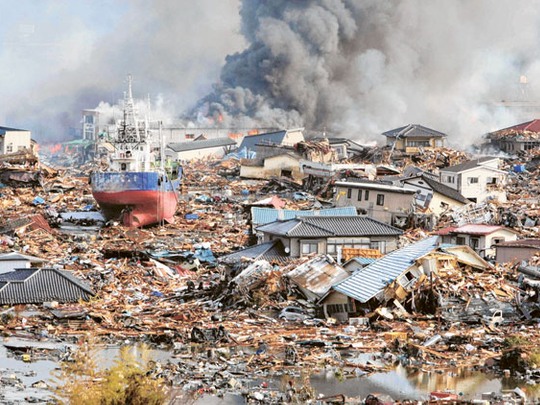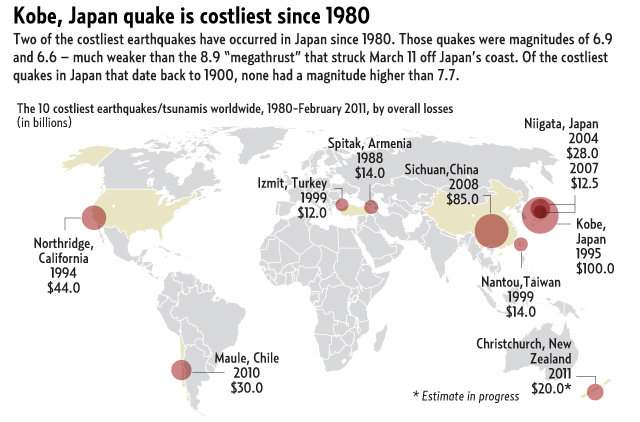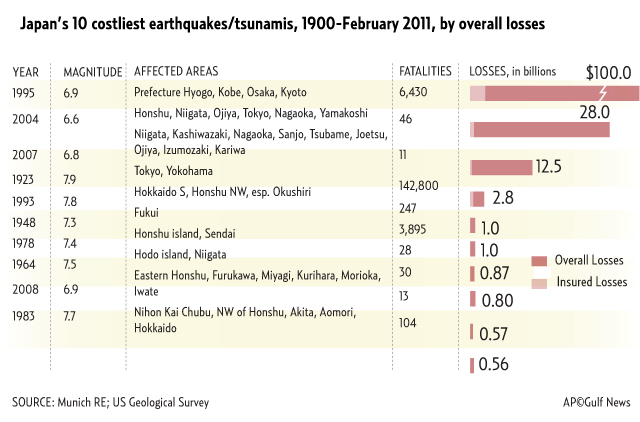
Tokyo: The cost of rebuilding from Japan's strongest earthquake on record will worsen the country's challenge of reining in the world's biggest public debt even as damage to the economy may be limited, analysts said.
The 8.9 magnitude shock devastated areas of northeast Japan including parts of Sendai, a city of 1 million that's 300km north of Tokyo. The Tohoku region accounts for about 8 per cent of gross domestic product, is host to factories making products from cars to beverages, along with energy infrastructure including a nuclear power plant the government said is at risk of meltdown after an explosion.
Factory shutdowns, power cuts and the damage to consumer confidence may hurt Japan's GDP for a period of months, while later contributing to growth as rebuilding occurs, economists said. Paying for the rebuilding risks hurting demand for Japanese government bonds, said Alicia Ogawa.
"A supplementary budget is like the last thing that people watching the JGB market want to hear," said Ogawa, adjunct professor at Columbia University's School of International and Public Affairs in New York, and a former Japanese banking analyst who lived in the nation for 15 years. The prospect of rebuilding "signals another leg down in Japan's fiscal health. So I'm concerned that in the short to medium run, there's going to have to be more borrowing," she said.
Debt load
The Ministry of Finance projected in January that government debt will increase 5.8 per cent to a record 997.7 trillion yen ($12.2 trillion) in the year starting April 1. That signaled Prime Minister Naoto Kan would break his pledge to limit bond sales to 44.3 trillion yen a year.
For Kan, the task of assembling a reconstruction plan adds to a burden that includes his failure so far to persuade opposition lawmakers to enact bills allowing the government to sell deficit-financing bonds in the coming fiscal year. The largest opposition party has signalled it's prepared to endorse post-earthquake spending.
"We will probably need a supplementary budget to work on this," Sadakazu Tanigaki, who heads the Liberal Democratic Party, told reporters yesterday after Kan convened a meeting of party leaders. "We will cooperate with all our might."
Japan's bond market has so far failed to signal concern at the fiscal outlook, with more than 90 per cent of government debt held by domestic investors led by financial companies. The yield on the benchmark security due in 2021 was 1.27 per cent late yesterday in Tokyo, compared with an average of 1.39 per cent over the past decade.
"This situation is likely to reverse as the government ramps up spending — and deficit financing — to repair the damage," Dan Ryan, an economist at Lexington, Massachusetts- based IHS Global Insight. "Considering that Japan's sovereign debt was recently downgraded, financial markets may become more wary of even an incremental increase in government borrowing and bond issuance."
Gridlock
Japan's rating outlook was lowered to negative from stable by Moody's Investors Service February 22 on concern that political gridlock will constrain efforts to tackle the debt burden. The ranking is Aa2, the company's third highest. Standard & Poor's cut its grade in January to fourth highest.
Stocks already began to respond to the quake, with the Nikkei 225 Stock Average tumbling 1.7 per cent by the close March 11, which came 14 minutes after the 2:46pm strike of the main earthquake, which has been followed by scores of aftershocks.
Companies from Sony Corp, Toyota Motor Corp, Honda Motor Co and Nissan Motor Co to Sapporo Holdings Ltd and refiner JX Nippon Oil & Energy Corp shut down facilities in northern Japan. Cosmo Oil Co suffered a fire at a refinery in Chiba, outside Tokyo, while Tokyo Electric Power Co battled to avert a meltdown to a nuclear power station 220 kilometers north of Tokyo after cooling systems failed.
The devastation has caused the death of at least 500 people, with more than 700 people reported missing as of the afternoon March 12. Kan, returning from an inspection of the devastated area around Sendai said he would mobilise 50,000 Self Defence Force personnel to aid the relief effort.
In Tokyo, residents emptied supermarket shelves and steeled themselves for a potential power outage flagged by Tokyo Electric Power. "The quake and the tsunami are a tragic devastation, but they will have only minimal impact on the Japanese economy overall," said Michael Boskin, a Stanford University economics professor in Stanford, California, and former head of the White House Council of Economic Advisers. "When there are natural disasters, there's a big disruption of capital and, tragically, life as well that will require capital to rebuild and so on. But it's not widespread enough to disrupt" GDP very much, he said.
GDP call
JPMorgan Chase & Co. for now maintained its projection for 2.2 per cent annualised gains in GDP for the first and second quarters of 2011, in a March 11 research note.
Provided the danger to the nuclear reactor is defused, "something several magnitudes lower than the 1.9 per cent GDP impact" of the January 1995 Kobe earthquake is likely, London- based ING Financial Markets analysts Rob Carnell and Tom Levinson wrote in a note. "One potential fly in the ointment, is that in 1995, although seriously challenged, Japan's fiscal situation was not in such a parlous state as it is today."
For its part, the Bank of Japan pledged to ensure financial stability, setting up an emergency task force and saying it will do everything to provide liquidity. Meantime, the Ministry of Finance may be prompted to intervene in the foreign exchange market should the nation's currency climb and risk worsening deflationary pressures and undermining export competitiveness, analysts said.
The yen advanced 1.4 per cent to 81.84 per dollar March 11, bringing its appreciation over the past year to about 10 per cent. The yen typically climbs during crises because Japan's current-account surplus means it doesn't need foreign funding and because of the likelihood of Japanese investors repatriating assets. Japan holds $882.3 billion of Treasuries, the highest tally after China, according to the US Treasury.
"Insurance companies are unlikely to buy overseas assets aggressively while they worry about pending claims" stemming from the earthquake, Mansour Mohiuddin, the head of global currency strategy at UBS AG who was in Tokyo for visits with clients and present for the earthquake, wrote in a note.














